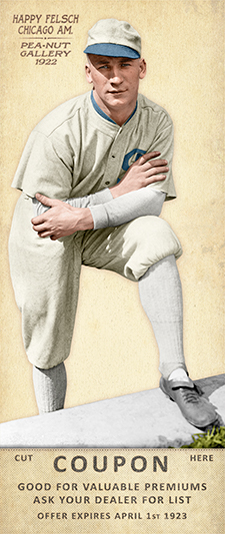- Card series: 1919 Black Sox Scandal
- City: Chicago
- Team: White Sox
- League: American League
Oscar Emil Felsch (1891-1964) was a sunny-tempered soul, the epitome of the hail-fellow-well-met. Born into the German community of Milwaukee, Felsch excelled at baseball and went on to become the star center fielder for the Chicago White Sox for six seasons spanning the most tumultuous era in franchise and baseball history. Charles Comiskey brought Hap to the Windy City in 1915 as part of one of the most successful rebuilding efforts in the game’s history. Felsch joined future Hall of Famer Eddie Collins and the incomparable “Shoeless” Joe Jackson, forming a club that would become a dominant force in the American League through the WWI years. Indeed, he forged the kind of career that Jim Nitz of SABR states might have been remembered “as one of the best all-around center fielders in baseball history.” He led his hard-hitting team in home runs and slugging, he was a league-leader in both offensive and defensive stats. And everybody loved Hap.
Years after the sordid story of the Black Sox had waned, Felsch, amiable as ever, was virtually the sole source for writer Eliot Asinof’s Eight Men Out. Hap was as humble as he was forthright in recounting his role in the scandal that shook baseball and ushered in the Judge Landis autocracy that forever changed the structure of the game. “I shoulda knew better,” moaned the aged and infirm former slugger. Earlier he had testified to foreknowledge and acquiescence to the gamblers’ schemes, but always denied actively trying to lose a game, much less the Series.
Despite his reputation for a very sociable demeanor, Felsch suffered under the indignities inflicted by miserly Comiskey. Injuries, his brother’s war wounds, his father’s illness, all took a toll as well in 1919, as did the clubhouse friction between players riven by the war effort. Felsch, Jackson and others had taken defense-industry jobs in ‘18 while others had enlisted. Rivalries erupted and friendships were damaged. Into the tensions stepped unctuous underworld minions of east coast mobsters. The resulting scandal enmeshed Felsch and he never pretended innocence.
- After being ousted from organized ball by Landis, Felsch endured years of litigation mingled with varying efforts to play ball. Eventually he went north and enjoyed success in Canadian circuits while always maintaining the love and support of his hometown
